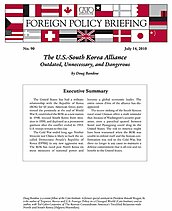The United States has had a military relationship with the Republic of Korea (ROK) for 65 years. American forces partitioned the peninsula at the end of World War II, established the ROK as a new nation in 1948, rescued South Korea from invasion in 1950, and deployed as a permanent garrison after the conflict ended in 1953. U.S. troops remain to this day.
The Cold War ended long ago. Neither Moscow nor China is likely to back the so-called Democratic People’s Republic of Korea (DPRK) in any new aggressive war. The ROK has raced past North Korea on most measures of national power and become a global economic leader. The entire raison d’être of the alliance has disappeared.
The recent sinking of the South Korean naval vessel Cheonan offers a stark reminder that, because of Washington’s security guarantee, even a parochial quarrel between Seoul and Pyongyang could drag in the United States. The risk to America might have been warranted when the ROK was unable to defend itself and the Korean confrontation was tied to the Cold War, but there no longer is any cause to maintain a defense commitment that is all cost and no benefit to the United States.

This work is licensed under a Creative Commons Attribution-NonCommercial-ShareAlike 4.0 International License.

